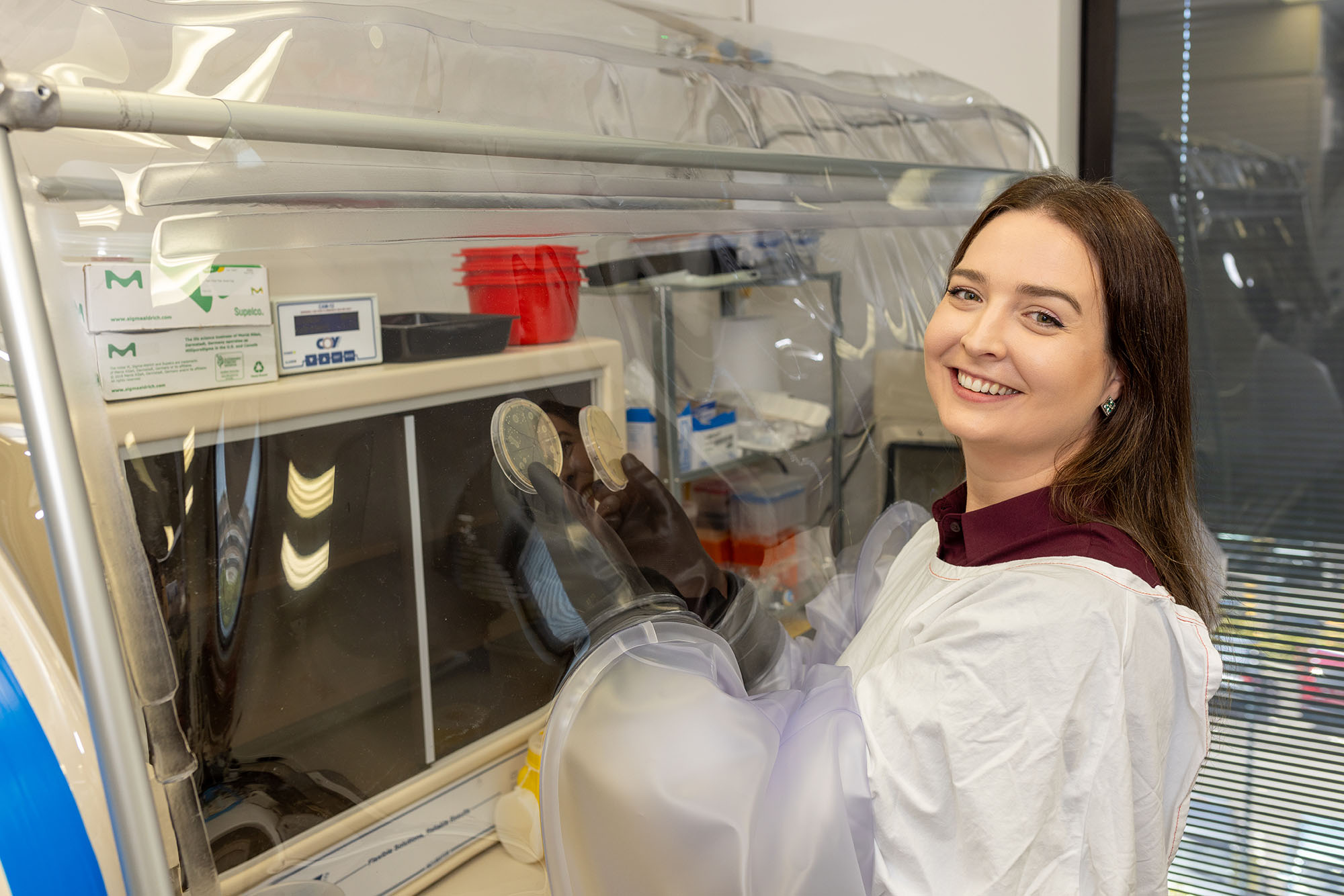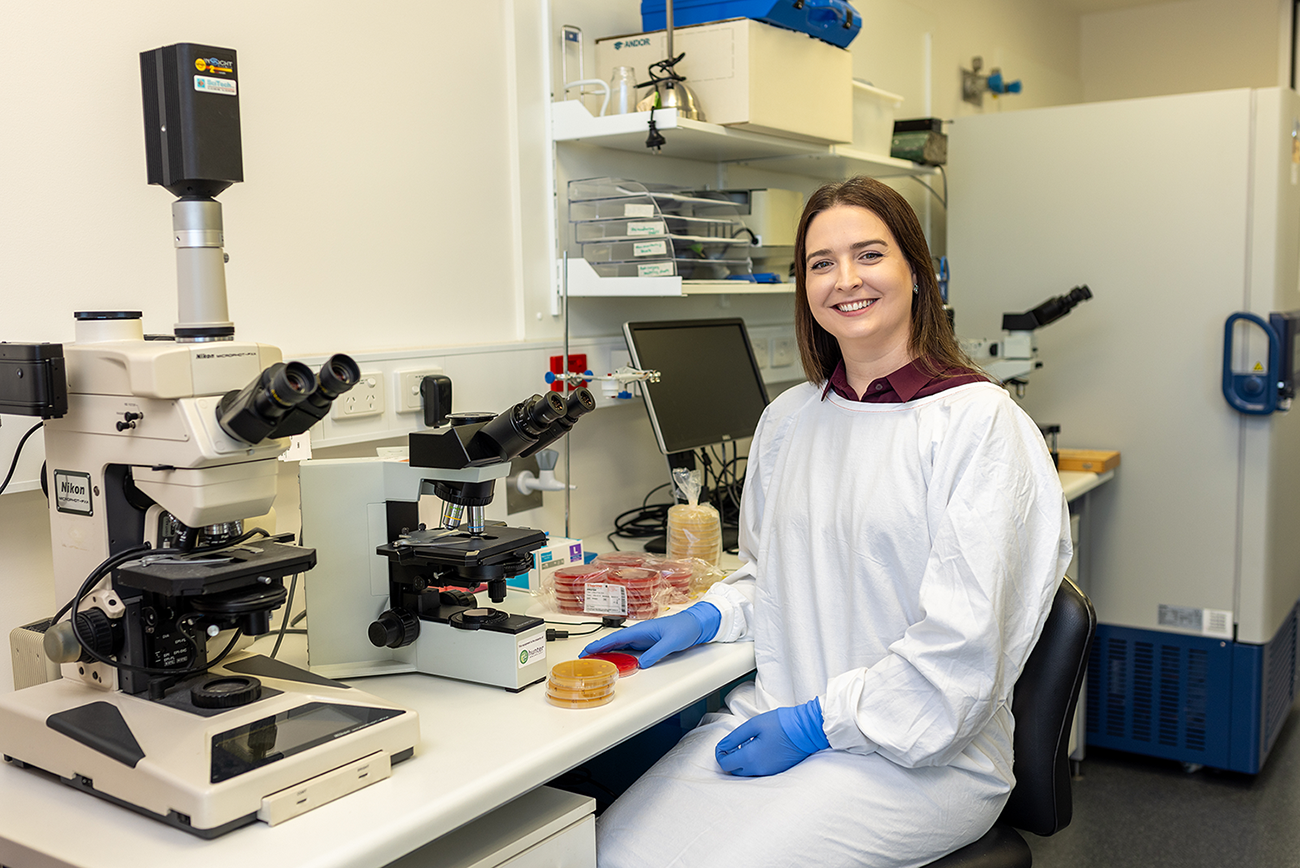Solving mysteries of the human microbiome
Microbiology Postdoctoral Research Fellow Dr Emily Hoedt (PhD), is engaged in ground-breaking work which is changing our understanding of the human microbiome.

This ecosystem of microbes that live in the human body can impact everything from depression and anxiety, to organ function, allergies, weight, and immunity. In the School of Biomedical Science and Pharmacy at the University of Newcastle, Hoedt’s work, which is supported by a grant from the Office for Health and Medical Research, involves the use of microbial clinical samples and computer-generated analyses. She is exploring how different microbes such as bacteria and fungi, grow and interact with human cells, and respond, change and adapt to different conditions.
One of Hoedt’s major contributions to her field has been the identification of key microbes in Crohn’s disease, a discovery that has furthered understanding of how the disease progresses. In other research, she has contributed to a probiotic formulation designed to restore health to the micriobiome of infants after antibiotic treatment. She is also exploring the gut-brain connection in a study to confirm the cognitive performance benefits of making changes to the gut microbiome. Hoedt’s important research is shedding light on the diversity of our microbes, how they function, what roles they play in the human body and how they impact the development of certain health conditions, diseases, surgical procedures and medical treatments.
Can you explain what the microbiome is and why it is so important?
The word ‘microbiome’ refers to a mixed community of microbes that live and work together in any environment. When researching the human microbiome, I study bacteria, fungi, viruses and archaea (which are similar to, but distinct from bacteria). You can find different microbiomes everywhere and the types of microbes present in those communities vary depending on the environment you are looking at. In nature for example, there are different microbiomes in soil, plants and the ocean. In a person, a variety of microbiomes can be found in the gut, skin, mouth, eyes, lungs and other parts of the body. The right balance of microbes is very important and we’re still trying to understand what the “right” balance should look like.
What drew you to work in the area of microbiome research?
Microbiology is my passion. It is fun growing new microbes and it’s both challenging and satisfying exploring the complexities of the human microbiome, as there is still so much to discover. The more we learn the more it becomes clear just how important the microbiome is in maintaining our health and wellbeing and influencing many different functions. For example, we know that the gut microbiome is critical in the digestion of foods, supporting our immune system, inflammation regulation (including healing), protecting against pathogens, and even influencing our brain function.
How are some of your microbiome discoveries being applied to healthcare and improving patient outcomes?
My research focuses on the human microbiome with the goal of influencing clinical practice in digestive health and disease management. Some examples of how my work is being applied to healthcare include the identification of food-microbiome interactions influencing dietetic practice (such as diet suggestions for a patient) in digestive health and wellbeing. While working with APC Microbiome Ireland and an industry partner, we made substantial progress in the development of a ‘synbiotic formulation’ – an approach which may recover infant gut microbiomes after antibiotic treatment. This has important implications for children’s health, as we know that disrupting the microbiome early in life has been linked to impaired development.
How is NSW Health supporting your work?
In 2023, I was awarded an Early-Mid Career Researcher Grant from NSW Health, through the Office for Health and Medical Research. It has been gratifying and exciting to receive this grant as it will support my research and the collection of valuable samples for microbiome analysis for the next three years. The funding is also allowing me to lead my own project that transitions my research from the lab to surgical policy and practice in the area of colorectal resections.

What is the focus of your current research?
My work, supported by the NSW Health grant, will characterise the microbiome of tissue from colorectal resections and a complication called ‘anastomotic leaks’. Colorectal resection is the mainstay treatment for many gastrointestinal diseases (colorectal cancer, diverticular disease, and inflammatory bowel disease). During the resection, segments of the bowel are removed and re-joined by a surgical procedure called an ‘anastomosis’. Anastomotic leak is the most severe complication of colorectal surgery. Mortality is high among affected patients, with the rates higher in elderly and frail patients, demonstrating that this is a significant health challenge for Australia. Those who survive an anastomotic leak experience long-term consequences, including poorer quality of life, worse cancer-related outcomes, and increased healthcare costs. Reducing anastomotic leak rates remains the most important surgical outcome in colorectal surgery, for patients, providers, and surgeons. My research aims to identify specific microbes that can predict anastomotic leak before it happens and work towards identifying microbes which may improve anastomotic healing. This project is a close collaboration with surgeons to facilitate expedited policy changes in colorectal resection surgeries.
Could you describe a few career highlights?
A recent highlight is definitely receiving the NSW Health grant to develop a rapid screening approach to reduce adverse surgical outcomes for patients undergoing colorectal resections. Prior to that, another highlight has been my work on the Department of Defence tender to investigate the gut-brain relationship in cognitive performance.
What kind of study did you undertake to qualify for your cutting-edge work?
I completed a Bachelor of Biotechnology with a Major in Microbiology. I knew I wanted to get into research, so continued my degree with an Honours placement. This lab placement really whet my appetite for science and encouraged me to complete my PhD in microbiology. After finishing all my studies in 2017, I worked as a Postdoctoral Researcher under a few different gastrointestinal projects to increase my experience in the field. I worked as a Postdoctoral Researcher at the University of Queensland and the University College Cork in Ireland. In my current role as Postdoctoral Research Fellow at the University of Newcastle, I now oversee all microbiome research within the Centre of Research Excellence in Digestive Health Newcastle team.
Can you describe what different tasks a day in your role might involve?
I split my day between the computer, analysing microbiome sequence data, and the lab, where I grow and describe different types of bacteria from clinical samples. As a researcher it is easy to get caught up in the lab and only talk about my findings with other researchers, but I really enjoy getting the opportunity to present my science to the general public. Hearing other people’s stories and perspectives really lends fresh eyes to my work and sparks new ideas on how I can help people with my work.
Another big part of my job is supervising students, teaching them how to analyse microbiome data for their respective projects.
What applications do you hope your work may have in the future?
Microbiome profiling methods are becoming cheaper and faster and I think in the future they will be a staple of healthcare. This would be a cornerstone of a personalized medicine approach, complimented by further research to identify specific microbes which could be used as a therapeutic solution to improve an individual’s health. I hope that my work will continue to contribute to those tailored treatments designed to modify a person’s microbiome and improve their health outcomes.
Updated 12 months ago